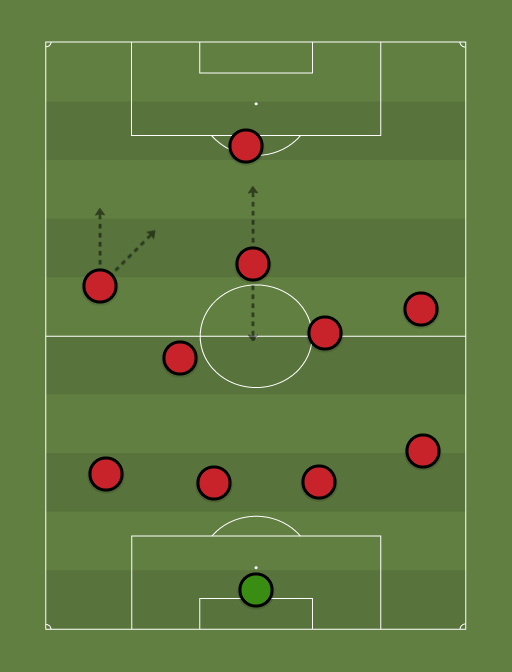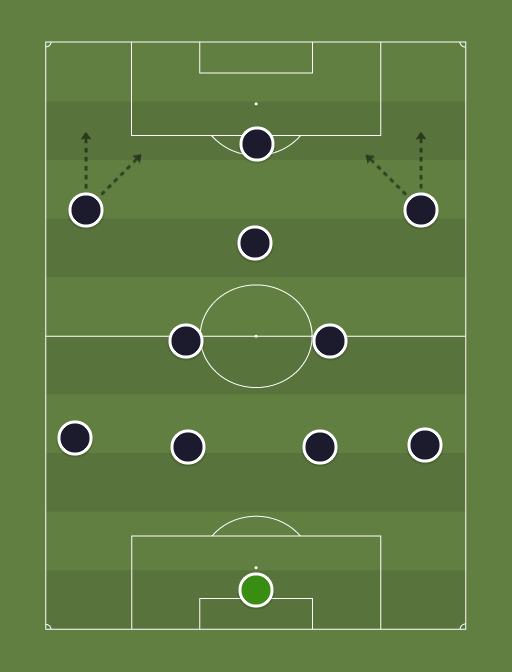........................Team Skizzo/Pat..................................................................Team Gio..........................................


Skizzo/Pat's tactics
Gio's tactics -


Skizzo/Pat's tactics
We’ve drafted exclusively from players who peaked in the post-1955 period following the advent of the UEFA club competitions. As a result we’ve assembled a squad with cast-iron credentials and pedigree at an international level. Of our starting XI, we boast no less than 7 European Cup/CL winners. 11 of our squad have won a European club trophy, and of the others, John Charles is a multiple-time Scudetto winner and Bobby Moore a World Cup-winning captain. We retain our lopsided 4-2-3-1, with the great Bertie Auld coming into our starting XI in place of Lampard. Auld provides a comparable goal threat to Lampard but additionally he was a fantastic playmaker, a tricky dribbler and a tenacious competitor in midfield, as well as being proven at the highest level of club football alongside Murdoch and Lennox. Bobby Lennox retains the exceptional pace to stretch Chester’s defence. Lennox will be slightly more advanced, ready to feed off Charles’ knockdowns and stretching Chester’s defence. Beckham will do as Beckham did, dropping deeper or infield to make Utd’s 4-4-2 work against elite opposition, and finding Charles with arguably the most consistent source of quality crosses in history.
Defence:
We field one of the all-time great British goalkeepers in Neville Southall. In front of him, Moore and Lawrenson form arguably the best centre-back pairing in the draft. Similar in dynamic to the great Hansen/Lawrenson partnership, Moore commands the defence with his peerless reading of the game, impeccable timing in the tackle and great distribution. Lawrenson complements him with his superb recovery pace and strength in the air. Flanking them are two of Utd’s greatest ever full backs.
Midfield:
The lynchpin of our midfield is “the beating heart of the Lisbon Lions” Bobby Murdoch, one of the very best midfielders in the draft. A combative ball-winner, a wonderful passer and a true leader, he is partnered in central midfield by the fiercely competitive Paul Ince. On the flanks, one of the most unerringly brilliant crossers of the ball ever in David Beckham, and the scintillatingly fast Bobby Lennox, who was putting up almost Ronaldo-esque goalscoring numbers from the wing nearly 40 years before we’d ever heard of Ronaldo. Rounding out the midfield is Murdoch's partner from the Lisbon Lions, Bertie Auld. Auld was tenacious and talented, combining great vision and touch with speed and aggression
Attack:
The legendary John Charles is arguably the best centre forward in the draft, with a brilliant goalscoring record, near-unstoppable ability in the air, and the rare distinction of being well-rounded enough to be world-class both as an attacker and a defender.
How The Game Will Be Won:
We have amazing passers littered throughout our team, and also an aggressive streak that can match our opposition. Gio has Souness, Mieklejohn, and also James to drop back into help in midfield, but they will have a tough time against Murdoch, Auld, and Ince. I believe we will have the edge in possession, because Beckham will also drop back to help in the midfield, and won't have a need to beat his man for him to be effective. His positioning will give us the numerical advantage in the midfield, enabling us to hold the ball and possess and probe for openings. Lennox gives us a dangerous outball on the wing, and Charles gives us a pivot point up front to play off. Having multiple routes to goal in term of a direct threat from Lennox, or a cross played in to Charles, the long shots or Murdoch and Auld, and set pieces of Becks...it's hard to shut down those threats effectively all game. While our opponent will also argue the same, I feel with Moore and Lawrenson marshalling the back, we are much better equipped to handle his threats, than his defence is equipped to handle ours.
Lisbon Lions and partnerships:
Auld and Murdoch formed probably the greatest center midfield partnership of their time, and played most other teams of that time off the park. With their teammate Lennox on the left wing, they have the familiarity of playing with each other, and an understanding that can be the difference in a close game such as this.
Neville and Beckham also have the understanding of playing together after spending years marauding and running the right wing for United. They have the benefit of knowing when each will be making runs, and when to overlap if the opportunity arises. They also offer cover for each other and can both put in a defensive shift when necessary.
Now I know that just because players played together, it doesn't mean they should win, but here we have players who can be considered among the best at their positions on an individual basis, but now we are also able to add the benefit of playing them in tandem with their teammates who they dominated domestically and in Europe with.
Gio's tactics -
TEAM
Every player in the team was either best-in-the-world-in-their-position calibre or were strong performers when their national teams were the best in the world (see England in the 1960s and 1990, Scotland in the late-1920s and 1930s). In Banks, Cole, Souness, Finney and Greaves, we have five who would be fair shouts for an all-time Britain and Ireland select. That's almost half of the starting XI. The defence combines sheer pace in Walker and Cole with Scottish steel in Miller and Young. At set-pieces the man-mountain George Young will be instructed to man-mark Charles who, in general play, will be tightly shepherded by Willie Miller. Ferguson rated Miller as the best in the world in a busy penalty box, the very area where Charles will pose his greatest threat. Cole meanwhile will press onto Beckham, safe in the knowledge that he has him for pace, while getting tight enough to cut off crossing opportunities. Graeme Souness should run the midfield with support from the all-round leader Meiklejohn who was famed for his ability on and off the ball. Together they will do the dirty work and cancel out any threat from Murdoch and Auld. They will support an exceptionally talented front four. Alex James, the passing master, will link midfield and attack, feeding the elusive trio up top. Morton is the wing wizard on the left, one of the very best these Isles have produced. On the right but with freedom to roam is the great Tom Finney who will surely get the better of many, if not all, the full-backs in the draft. The predator up front is Greaves, the foremost goalscorer in the draft, who will thrive on the service provided by Finney, Morton and the assist king James.
THE WAY IT WILL GO
Two similar systems means there will be a number of critical head-to-head battles that will decide the match. Souness should be able to run the midfield allowing enough of a platform for Alex James to get on the ball and feed Morton, Finney and Greaves. Moore is obviously top class but there are potential mismatches right across the remainder of the defence with Lawro, Dunne and Neville getting pulled in all sorts of directions trying to keep tabs on that mobile, inventive and incisive front three.


